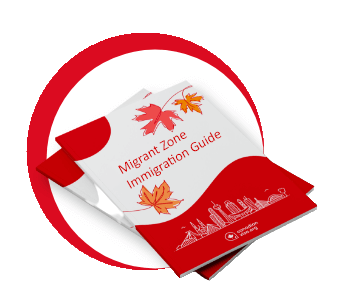Work in Canada
According to our recent polls, almost 50% of people moving to Canada are moving there to work. It's safe to say that Canada is known worldwide for its booming economy and its welcoming nature towards foreign workers. The constant expansion of the Canadian industry combined with the aging, often overeducated population means Canadian employers have to turn to workers overseas to fill the worker-to-retiree ratio.
As a result, Canada offers foreign workers - like yourself - fantastic opportunities that can’t be found elsewhere. However, before you begin work in Canada, here are eight factors to help you understand what it will be like.
Canada is Searching for Educated People

Employers in Canada are prioritizing skilled foreign workers, preferably those who are recent graduates from universities, colleges and trade schools.
According to the World Population Review, Canada is currently the most educated country in the world. As a result, they pride themselves on having an extremely well-educated population and many of Canada's key industries, like tech, require extensive education.
If you have some tertiary education, you may have the opportunity to gain permanent residence in Canada via the Express Entry or Provincial Nominee Programs. However, what can go far is having a Canadian qualification before looking for jobs in Canada. If you want to study a fantastic, internationally-recognized Canadian program, look at this page to give you a full breakdown of how to study in Canada.
Graduates Often Work in the Career They Studied

According to Statistics Canada, 93% of recent graduates in Canada find a job in their chosen field two years after completing their studies. The government of Canada has a great support system for recent Canadian graduates called the Post Graduate Work Permit Program (PGWPP). If you plan on studying in Canada, this program may give you a fantastic opportunity to find gainful, meaningful employment once you've completed your studies.
However, if you've completed your studies outside of Canada and don't plan on studying further, this doesn't mean you can't work in your chosen sector. With over 1 million job vacancies nationwide, the opportunity to land your dream job could be waiting for you.
However, to be allowed to work in Canada, you will need a Canadian work permit which requires you to fulfill specific, vital criteria and go through an extensive process to ensure your eligibility. Look at this helpful guide to show you how to get your Canadian work permit.
If you want to make sure you're eligible and take the guesswork out of your Canadian work permit application, speak to a Regulated Canadian Immigration Consultant (RCIC) who can help you through every step of the application process.
Tech Jobs in Canada are in High Demand

Canada's tech industry is one of the largest and fastest-growing sectors of the Canadian economy. Currently, there are over 43,200 companies in the Canadian Information and Communications Technologies (ICT) sector - and tech jobs are so high in demand that the government of Canada has created multiple immigration pilot programs specifically focused on bringing skilled tech workers into Canada.
To show the extent of the opportunities available to foreign workers, look at this article which breaks down the options available to software developers.
If you have a tech background, you may be interested in using programs such as the Ontario Tech Pilot, the Alberta Accelerated Tech Pathway and the British Columbia Tech Pilot to supercharge your chances of living and working in Canada. For an example of the types of tech jobs in high demand in Canada, look at this article.
In Canada, You Get Two Paychecks

A great benefit of working in Canada is the bi-weekly paychecks. In Canada, it's widely accepted that employees get paid both at the beginning and middle of each month. This ensures employees have disposable income throughout the month and prevents lower-income households from being left without funds for prolonged periods.
Canadian working culture has numerous quirks and differences from many countries worldwide. With their multiple short breaks, casual clothing every Friday, two paychecks and relatively structured working hours - this is proof that working in Canada may be different from what you're currently used to, but don't worry. Canada’s hospitable, helpful nature will ensure you quickly find your feet.
You May Get Lost in Translation
Canada has two official languages - English and French. Depending on your employer in Canada and province, your medium of instruction could be in either of these languages. Because of this, the Canadian government has a language requirement for all visa and immigration programs. These are mainly categorized under the Canadian Language Benchmark (CLB). To understand how the CLB works, the language requirements for your specific program and how language is tested in Canada, look at this full breakdown.
If you want to ensure your English-language ability is up to scratch for your immigration/ visa program and your job in Canada, you're in luck. We at migrantzone.com offer a complete International English Language Testing System (IELTS) preparation course to help you score high and to quickly assimilate into the Canadian working environment.
Canadian Workers have a High Quality of Life

From a purely financial perspective, Canadian workers generally have a high quality of life. The cost of living and salaries in Canada widely vary, depending on your province, level of employment and occupation. However, according to the Canadian job site, Jobilico.com, salaries in Canada in 2021 worked out to, on average, CA$65, 773.18 per person per year. By comparison, the average cost of living in Canada for a single person (not including rent/ housing costs) is approximately CA$14, 347. 32. However, this naturally differs per person, and if you want to see what you can expect your cost of living in Canada to be, this article can help point you in the right direction.
Canada's Job Benefits are Second to None
Canada's excellent salaries are not the only perk of working in Canada - working in Canada often means indulging in some fantastic benefits of being part of the Canadian workforce.
The Canadian government has mandated that all Canadian workers get:
- Pension
- Legislated and parental leave
- Employment insurance
- Eye exams
However, most benefits are dependent on your Canadian employer and how they choose to run their company. To fully understand how these benefits work and how they will affect your work in Canada, look at this article.
Your Job is Classified
All jobs in Canada are classified under the National Occupational Classification (NOC) system. Under the NOC system, each job is given a Canada NOC code, which classifies an occupation's Skill Type, Skill Level, Industry and education requirements. You must know the Canada NOC code for your occupation before you apply for a work permit in Canada.
To gain a complete understanding of how NOC codes work and how to work out your own Canada NOC code, have a look at this handy guide. If you're unsure as to how to determine your Canada NOC code and how to ensure you know how to use it correctly, click the button below to have an RCIC help you.
FAQs
How can I find jobs in Canada?
One of the best ways to find jobs in Canada is to start online. Some of the best sites to find jobs in Canada are:
However, if you want to know all the tips and tricks to ensure you have the best possible chance of landing a job offer from a Canadian employer, look at this useful guide.
What type of jobs in Canada is readily available?
As Canada has widely different industries which vary, depending on your province, this video breaks down the jobs that currently have the highest demand for new workers in Canada.
pe; picture-in-picture" allowfullscreen="" data-src="https://www.youtube.com/embed/Y3krn5flo9E" class=" lazy">Look at this page to determine which jobs have the highest demand per province.
Who is eligible to work in Canada?
While there are several criteria for you to be admissible to Canada, the defining factor in someone's eligibility for a job in Canada is a Canadian work permit.
To get one of these, you must have an offer of employment from a Canadian employer who has completed a Labour Market Impact Assessment (LMIA). To help you find out how to do that, here's a straightforward guide that breaks down all the eligibility requirements and the process of acquiring a Canadian work permit.
Is there any way I can move to Canada without a job offer?
Yes, there are multiple ways for foreign nationals to move to Canada without a formal offer of employment. Look at this article to explore the various pathways presented to those without a job offer.
What is the minimum wage in Canada?
Canada's minimum wage varies depending on the province, as each province has a different cost of living. Below, this table breaks down the current minimum wage per province.
| Province | Minimum Hourly Wage |
|---|---|
| Alberta |
$15.00 |
| British Columbia |
$15.65 |
| Manitoba |
$11.95 |
| New Brunswick |
$12.75 |
| Newfoundland & Labrador |
$13.20 |
| Northwest Territories |
$15.20 |
| Nova Scotia |
$13.35 |
| Nunavut |
$16.00 |
| Ontario |
$15.00 |
| Prince Edward Island |
$13.70 |
| Quebec |
$14.25 |
| Saskatchewan |
$11.81 |
| Yukon |
$15.70 |
Ask an RCIC:
How can people ensure that they are not being misled by the current cost of living in Canada before deciding to settle in Canada?
They can do their own research online about the cost of main components of living such as housing, transportation and food.
Build Your Dream Future in Canada

With so many fantastic opportunities in Canada, working in Canada could be the step forward you've been looking for. Make sure you start your journey to Canada in the best way possible by clicking the button below to have an RCIC evaluate you and ensure every step of your application process goes as smoothly and effectively as possible.




